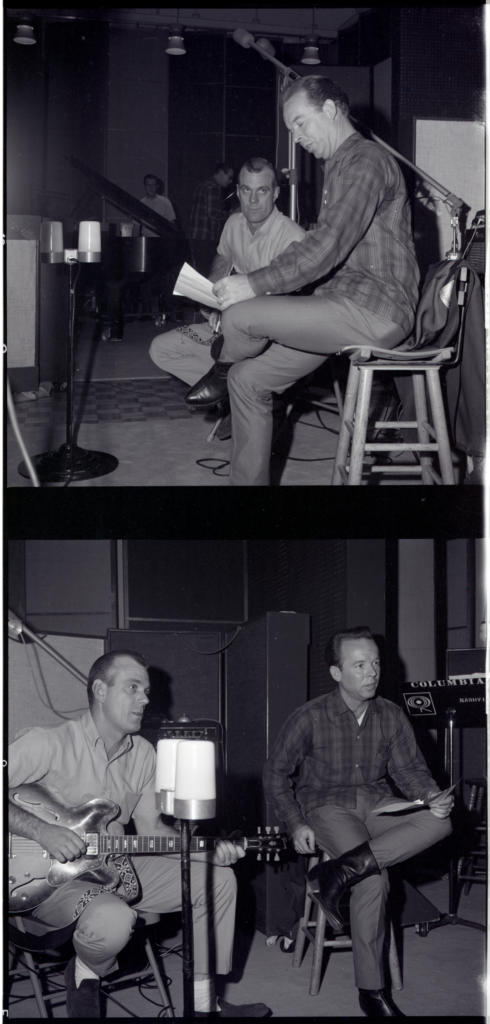NASHVILLE — Ray Edenton, a versatile session guitarist who played on thousands of recordings by artists like the Everly Brothers, Charley Pride, Neil Young and Patsy Cline, died on Sept. 21 at the home of his son, Ray Q. Edenton, in Goodlettsville, Tenn. He was 95.
His death was confirmed by his daughter, Ronda Hardcastle.
A longtime member of Nashville’s so-called A-Team of first-call studio professionals, Mr. Edenton contributed discreet, empathetic rhythm guitar to myriad hits in a career that spanned four decades. His name was less known than his musicianship, but generations of listeners knew the records he helped make famous, a body of work estimated to exceed 10,000 sessions.
Ms. Cline’s “Sweet Dreams,” Webb Pierce’s “There Stands the Glass,” Kenny Rogers’s “The Gambler,” Roger Miller’s “King of the Road” and Loretta Lynn’s “You Ain’t Woman Enough” were among the blockbuster country singles, many of them also pop crossover successes, that featured his guitar work.
“I did 22 sessions in five days one week,” Mr. Edenton, who retired in 1991 at age 65, said in looking back on his years as a studio musician during an interview at an event held in his honor at the Country Music Hall of Fame and Museum in Nashville in 2007.
“That’s four a day for three days and five a day for two days,” he went on. “You don’t go home on five-a-days, you sleep on the couch in the studio.”
On the Everly Brothers’ “Wake Up Little Susie” and “Bye Bye Love,” both of which reached the pop, country and R&B Top 10 in 1957, Mr. Edenton played driving, syncopated acoustic guitar riffs alongside Don Everly.
“I lived for quite a few years off those licks I stole from Don,” he said at the 2007 event.
It was in fact the two men matching each other note for note that gave those big-beat Everly classics their distinctive stamp.
Although primarily a rhythm guitarist, Mr. Edenton was occasionally featured on lead guitar, notably on Marty Robbins’s 1956 recording “Singing the Blues,” which was galvanized by his careening electric guitar solo. His lead work on 12-string acoustic guitar was heard on George Hamilton IV’s 1963 hit “Abilene” — a record that, like “Singing the Blues,” topped the country chart and also reached the pop Top 20.’
Mr. Edenton was also a songwriter. His chief credit was “You’re Running Wild,” a Top 10 country single for the Louvin Brothers, written with his brother-in-law at the time, Don Winters, in 1956. (He also played rhythm guitar on the recording.)

Mr. Edenton’s work as a session musician reached beyond country music, with singers like Julie Andrews, Rosemary Clooney, Sammy Davis Jr. as well as rock acts like Elvis Presley, Roy Orbison and the Sir Douglas Quintet. He played on Mr. Young’s acclaimed 1978 album, “Comes a Time.”
He also took part in the Nashville sessions that produced the album “Tennessee Firebird,” a pioneering fusion of country and jazz released by the vibraphonist Gary Burton in 1967.
“Everybody in the world came here, and we recorded with all of them,” Mr. Edenton said of Nashville’s studios in his Country Music Hall of Fame interview. “You might do a pop session in the morning and bluegrass in the afternoon and rock ’n’ roll at night.”
In 2007, Mr. Edenton, who played mandolin, ukulele and banjo as well as guitar, was inducted with the rest of the A-Team into the Musicians Hall of Fame.
Ray Quarles Edenton was born on Nov. 3, 1926, in Mineral, Va., a gold-mining town about 50 miles northwest of Richmond. He was the youngest of four children of Tom Edenton, a sawmill operator, and Laura (Quarles) Edenton, a homemaker.
Young Ray taught himself to play ukulele and guitar at an early age and later provided music for square dances with his two older brothers, who played fiddle and guitar.
In 1946, after serving in the Army, he joined a band called the Rodeo Rangers, which performed at dances and on the radio in Maryland and Virginia. Two years later he became the bassist for the Korn Krackers, an ensemble led by the guitarist Joe Maphis that appeared on the Richmond radio show “Old Dominion Barn Dance.” He began working at WNOX in Knoxville in 1949 before being treated for tuberculosis in a Veterans Administration hospital, where he spent 28 months.

Mr. Edenton moved to Nashville in 1952 and became a guitarist at the Grand Ole Opry while also working in the touring bands of, among other luminaries, Hank Williams and Ray Price. A notable early recording session was “One by One,” a honky-tonk weeper that was a No. 1 country hit for Red Foley and Kitty Wells in 1954.
Most country acts of the era did not feature drummers in their lineups. Mr. Edenton’s nimble, unobtrusive guitar playing, inspired by the cadences of a snare drum, created a steady demand for his services among record companies, especially when he was tapped to fill the vacancy created on the A-Team when the guitarist Hank Garland suffered disabling injuries in a car accident in 1961.
Besides his daughter and his son, Mr. Edenton is survived by his wife of almost 50 years, Polly Roper Edenton. His marriage to Rita Winters, a country singer who performed under the name Rita Robbins, ended in divorce.
“People often ask me about session musicians and why, back in those days, only a few people made all the records,” Mr. Edenton said in 2007, reflecting on his heyday with Nashville’s A-Team.
“It was several things. You had to learn real quick. You had to adapt real quick. And if you couldn’t do that, you couldn’t do sessions.”



















Comments